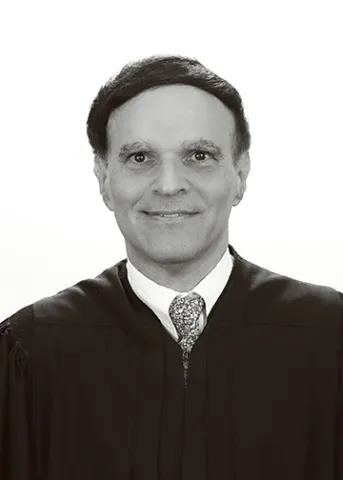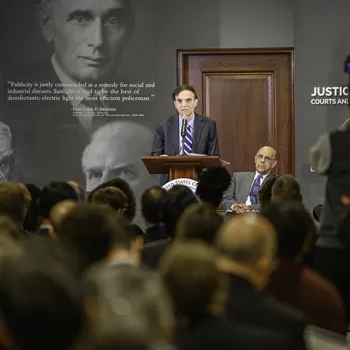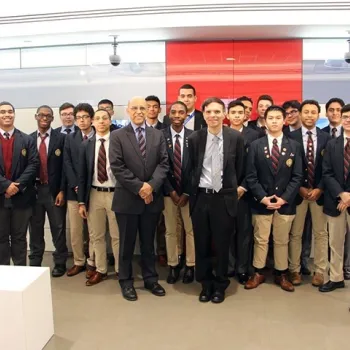
Judge Robert A. Katzmann
Robert A. Katzmann, a former chief judge of the Second Circuit U.S. Court of Appeals and a tireless, impassioned advocate of civics education, died June 9. He was 68.
In a statement, Chief Judge Debra A. Livingston praised Katzmann’s “sure and steady leadership” of the Second Circuit. She added, “Judge Katzmann, with his commitment to civic education, also had a vision for the Circuit – that the judiciary might lend a steadying hand to our democracy by helping to educate the citizenry about the rule of law and the role of judges.”
Katzmann envisioned and co-created a dynamic learning center in the Thurgood Marshall U.S. Courthouse in New York City. The flexible design is adaptable to many uses and includes a podcasting studio.
Katzmann initiated Justice for All: Courts and the Community in the Second Circuit, which encompasses district courts in New York, Connecticut, and Vermont. The circuit-wide committee, which Katzmann co-chaired with U.S. District Judge Victor Marrero, brings judges, court staff, lawyers, and civics education leaders together to develop and implement a cohesive outreach strategy. It is supported by an interactive educational website.
In 2019, Katzmann initiated and hosted the first national civics conference for the federal Judiciary as a catalyst for judges and staff to take educational outreach to the next level. The Justice for All program and the 2019 conference both were praised by Chief Justice John G. Roberts, Jr., in his 2019 Year-End Report on the Federal Judiciary.
Katzmann was born in New York, the son of a father who fled from Nazi persecution and a mother who was a child of Russian immigrants. As he recalled in a 2014 New York Daily News commentary, this heritage helped inspire his commitment to civics education.
In a 2017 article, Katzmann said that educating young people about civics was essential to the nation’s future.
“Students who learn about and appreciate the Constitution and courts grow up to be adults who respect and support them,” he said. “Understanding our system of constitutional liberty keeps our democracy strong and safeguards the rights of all Americans.”
According to his Judiciary biography, Katzmann received degrees from Columbia, Harvard, and Yale universities before working from 1981 to 1999 at the Brookings Institution. As one of the nation’s leading scholars on judicial-legislative relations, Katzmann wrote “Courts and Congress,” among several books he authored in his lifetime.
President Bill Clinton appointed Katzmann to the Second Circuit in 1999. He served numerous roles in the Judicial Conference of the United States and its committees, most notably as chair of the Judicial Branch Committee, where he stressed the importance of the Judiciary’s role in civics education.
In 1993, Sen. Daniel Patrick Moynihan, of New York, asked Katzmann to shepherd the U.S. Supreme Court nomination of Ruth Bader Ginsburg through the Senate. Katzmann and Ginsburg became close friends, and Ginsburg administered the oath of office when Katzmann became an appellate judge. The justice described her friend as possessing the “personal qualities important to sound judging: an inquiring mind, extraordinary diligence, patience, and a readiness to learn and listen.”
On the bench, Katzmann witnessed what he believed to be a profound lack of quality legal representation for the immigrant poor. He organized an interdisciplinary group of representatives from advocacy organizations, the bar, and government, which eventually led to creation of the New York Immigrant Family Unity Project. It provides representation to non-citizens who are detained, indigent, and facing deportation.
During his tenure, Katzmann received multiple awards and honors, including the Thurgood Marshall Award of the American Bar Association.
Katzmann was the chief judge of the Second Circuit from 2013 to 2020. Livingston, who succeeded him in that role last September, noted his ability to navigate major crises.
“Judge Katzmann led our Court through historic challenges, from budget sequester and governmental shutdowns, at the beginning of his tenure as Chief, to the pandemic which upended our Court’s operations only last spring,” Livingston said. “His quiet confidence, determination, exceptional leadership, and strong sense of justice inspired us all. We will miss him profoundly.”
Judge Katzmann is survived by his wife, Jennifer, a filmmaker, writer, and editor. His brother, Gary S. Katzmann, is a judge on the U.S. Court of International Trade.
Subscribe to News Updates
Subscribe to be notified when the news section is updated.


